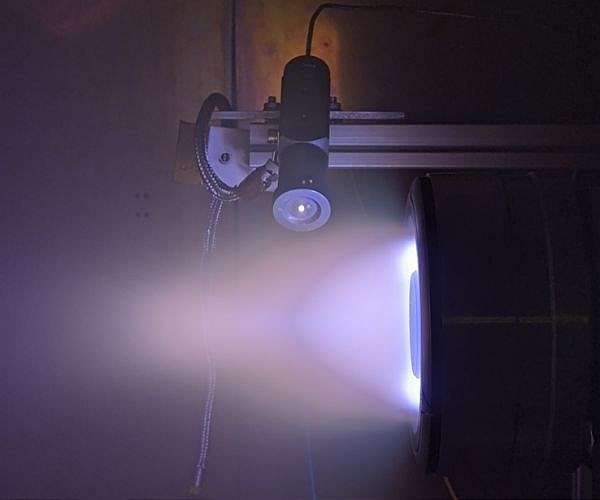14.08.2023

A Hall Effect Space Thruster, built in the UK by Pulsar Fusion undergoing testing at the University of Southampton
Electric propulsion, with a specific focus on Hall effect thrusters, has long been recognized as a foundational technology for space missions. Recognizing its potential, the UK Space Agency has recently announced a collaboration with the Plasma dynamics and Electric Propulsion Lab at the University of Michigan, one of the premier Hall thruster research centres worldwide.
This international endeavor is further bolstered by the inclusion of renowned Hall thruster entities such as Pulsar Fusion from the UK, Starlight Engines from the US, and the University of Southampton from the UK.
NASA has previously underscored the importance of electric propulsion, spotlighting its role for the upcoming decade, especially when it comes to high-power electric propulsion and propellants. Hall thrusters have emerged as an essential component for various spacecraft missions. These missions span from geostationary satellites to more distant interplanetary endeavors.
Hall thrusters are notably utilized in robotic rendezvous missions. Established names in the field, such as Northrop Grumman and Astroscale, have incorporated them for critical operations, including spacecraft de-orbiting. These thrusters are also pivotal in interplanetary missions, with notable examples being the Lunar Gateway Space Station and the NASA Psyche mission.
Historically, a distinct gap has been observed in the collaboration between the UK and the USA regarding Hall thruster research. With this new partnership, this void is set to be bridged, marking the first time such a collaboration is undertaken. This move allows the UK to harness and benefit from the world's leading research and development in this area.
This groundbreaking alliance will receive funding from the inaugural phase of the UK Space Agency's 20M pound International Bilateral Fund. Additionally, it's worth noting that this is the second project bestowed upon Pulsar Fusion by the UKSA.
Richard Dinan, the CEO of Pulsar Fusion, expressed his insights on this novel collaboration. He mentioned, "As a manufacturer of space engines, there are regulatory challenges in being based in the UK, but England does have a fantastic talent pool and our scientists deserve to be at the forefront of these emerging technologies."
He further highlighted the strategic importance of this partnership, stating, "This is another key US partnership for Pulsar - we continue to pursue best-in-class innovation, and this is particularly exciting given the global commercial interest in these engines. Following last month's announcement of our work with Princeton Satellite Systems, we remain optimistic that companies like Pulsar can continue to advance our technologies whilst remaining in the UK with access to unparalleled scientific resources."
With this collaboration in place, the horizons of electric propulsion are set to expand, potentially revolutionizing future space missions and technological advancements in the field.
Quelle: SD

